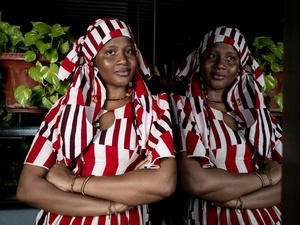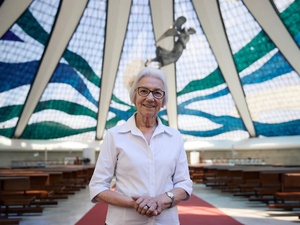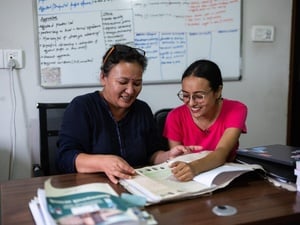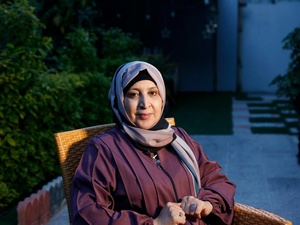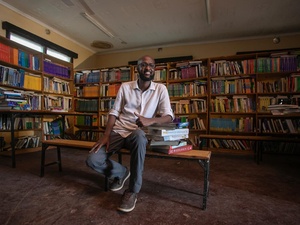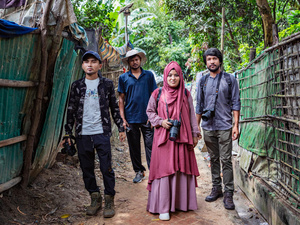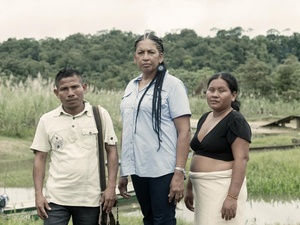2006 Nansen Refugee Award goes to Japanese man with global vision
2006 Nansen Refugee Award goes to Japanese man with global vision

Nansen Refugee Award winner Dr. Akio Kanai tests a refugee woman's eyesight in Nepal in 1994. The Fuji Optical chief has provided spectacles to over 100,000 uprooted people during his more than two-decade-long partnership with UNHCR.
GENEVA, July 4 (UNHCR) - The prestigious Nansen Refugee Award will go this year to Japanese optometrist Dr. Akio Kanai, who over more than two decades has improved the quality of life of over 100,000 uprooted people around the world by testing their eyes and providing them with spectacles.
The Nansen Refugee Award Committee selected Dr. Kanai, chairman and chief executive officer of Fuji Optical, for his practical commitment to humanitarian work and dedication to easing the plight of refugees by improving their eyesight.
The committee found Dr. Kanai had "rendered exceptional service to the refugee cause" and had made a huge and genuine contribution to uprooted people in human as well as financial terms. Dr. Kanai's company is based in Japan's northern island of Hokkaido.
"I am deeply honoured and grateful to have been chosen as the 2006 Nansen Refugee Award recipient. This award is testimony to the significance that the role of optometry plays in the future of refugees by improving their sight and thus empowering them to secure a 'future in focus,'" Dr. Kanai said from Japan on Tuesday.
The annual Nansen Refugee Award is given to individuals or organizations that have distinguished themselves in work on behalf of refugees. It includes a US$100,000 grant from Norway and Switzerland for a refugee-related project of the winner's choice and is scheduled to be presented in October during the annual gathering in Geneva of UNHCR's governing Executive Committee.
"Tens of thousands of displaced people living in extremely difficult circumstances have been given a new outlook on life thanks to Dr. Kanai," said UN High Commissioner for Refugees António Guterres. "The gift of sight is precious. Restoring it makes a huge difference in individual lives, making learning possible for children and adults and pulling them back from the fringes of marginalisation."
Dr. Kanai, himself forcibly displaced from the northern Pacific island of Sakhalin at the end of World War II, started his humanitarian optometry work in 1983 in Thailand with Indochinese refugees, many of whom had lost or broken their glasses while fleeing. Many were undergoing courses ahead of being resettled and needed glasses to study. Dr. Kanai checked the sight of the refugees and, in doing so, started a long engagement with refugee work.
He began cooperating with UNHCR in 1984, and has since conducted more than 24 missions to help uprooted people in Nepal, Thailand, Azerbaijan and Armenia. He has donated more than 108,200 pairs of glasses, provided optometry equipment, made cash grants and trained local medical staff. Fuji Optical is UNHCR's longest-serving corporate partner.
Dr. Kanai's family and his staff are also involved in Fuji Optical's Vision Aid missions. Some 70 employees have taken part in the aid missions, using their holidays to work in refugee camps.
The Japanese optometrist, noting that the use of spectacles was essential for countless refugees and internally displaced persons, said: "It has been a pleasure for myself, as well as all of those who participated and partnered in Fuji Optical's Vision Aid missions over the past 23 years, to have played a small part in assisting these people enjoy the benefits of corrected sight."
Dr. Kanai said the missions would not have been possible without the support of UNHCR. "In continuing partnership with the UNHCR, we look forward to a long and productive future - empowering refugees by serving their essential vision needs."
The Nansen Refugee Award, created in 1954, is named after Fridtjof Nansen, the celebrated Norwegian polar explorer and the world's first international refugee official. Previous recipients include Eleanor Roosevelt, Médecins Sans Frontières, Queen Juliana of the Netherlands and Graça Machel.
Last year, the award went to Margarita Barankitse, also known as the "Angel of Burundi," in recognition of her work with separated children whose lives have been devastated by war and the scourge of HIV/AIDS.



